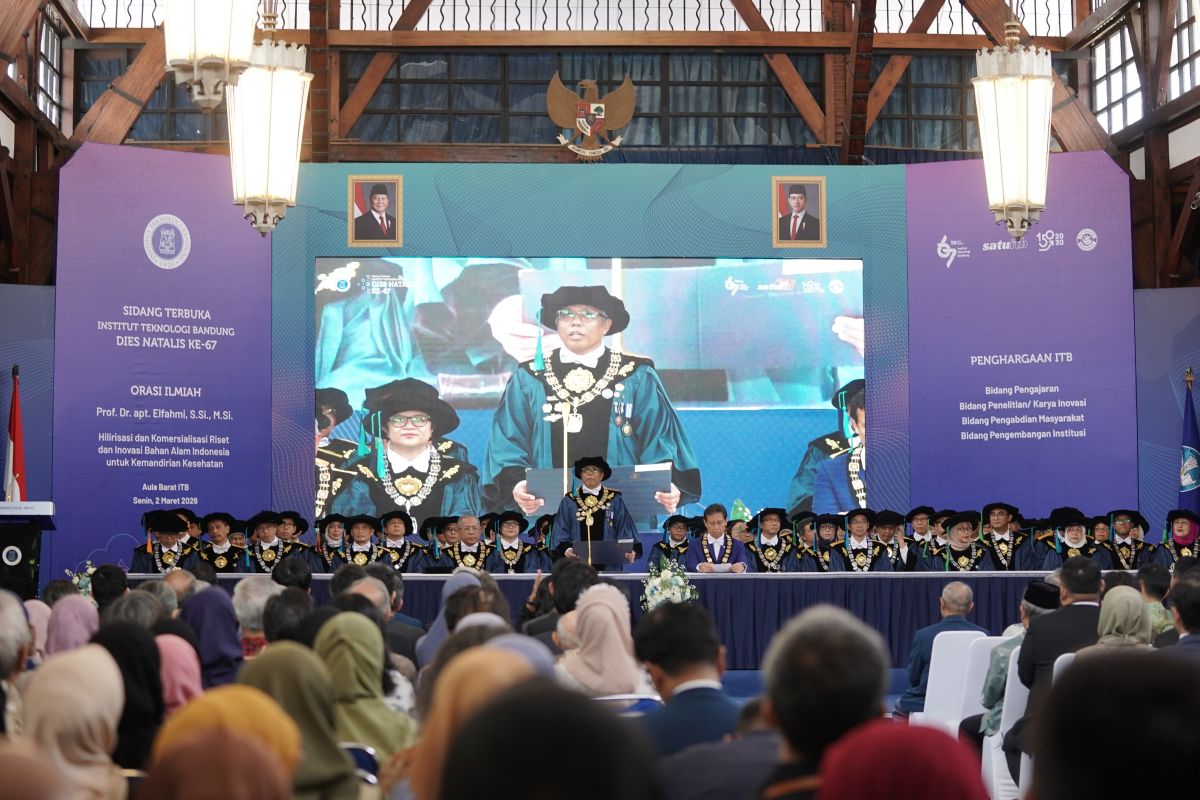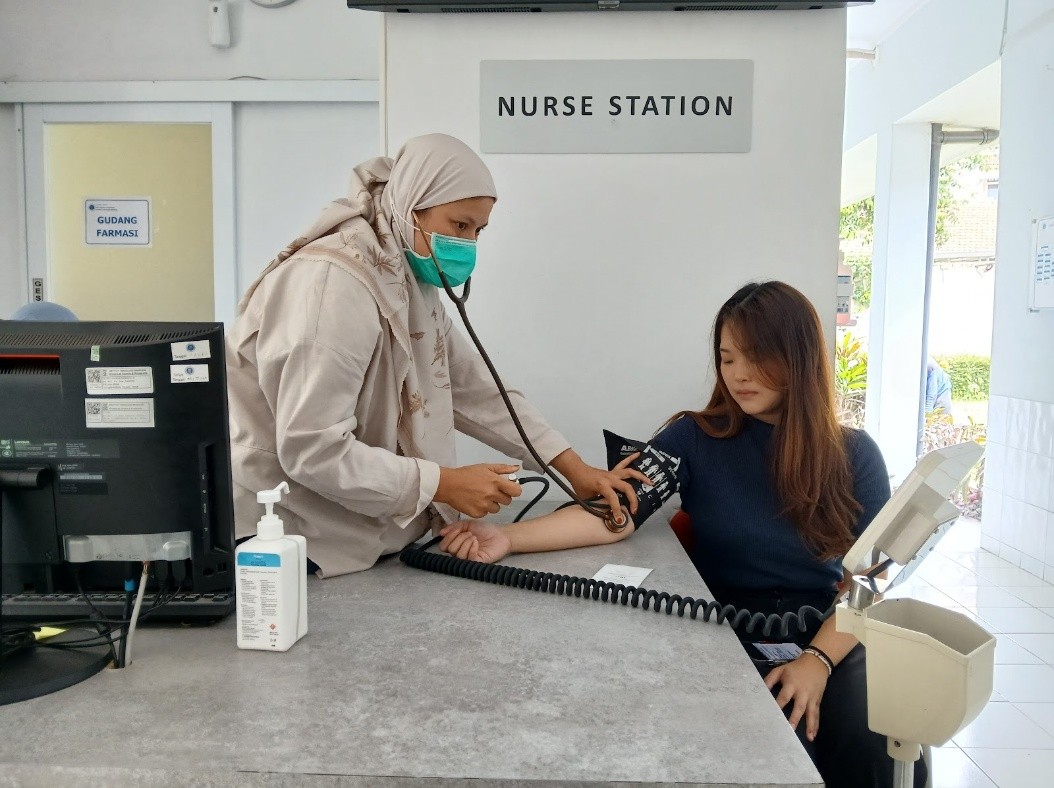Want to Study at ITB? Check out the ITB's New Student Admission for 2023
By Adi Permana
Editor Adi Permana

BANDUNG, itb.ac.id - Over the next few months, Institut Teknologi Bandung will be welcoming the arrival of its new students. However, before being officially called "an ITB student," there is an extensive selection process that prospective students must pass through. To give these prospective students a better understanding of the selection process, ITB held an online socialization through Zoom and YouTube Live. The socialization was conducted online with the hope that students all over Indonesia would not miss the occasion.
The socialization was opened with an explanation from Dr. tech. Ir. Arief Hariyanto, the Director of Education of ITB. Arief explained that ITB had three different campuses located in different places: Ganesa Campus (in Bandung), Jatinangor Campus (in Sumedang), and Arjawinangun Campus (in Cirebon). As the youngest campus, Arjawinangun currently does not have as many facilities compared to the other campuses. However, Arief emphasized that ITB would ensure equal quality of education on all three campuses.
Afterward, he reminded prospective students to choose their study programs wisely. Arief gave four bases for consideration in choosing a study program: interests as well as talents, passion, vision, and career opportunities. "Don't just follow the crowd. It all must come from within yourself," asserted Arief.
The Director of Education then continued his explanation by elaborating on the pattern of student admissions at ITB, which comes in three ways: faculty/school, faculty/school, and campus (Faculty-Campus), or faculty/school and discipline (Faculty-Discipline). Arief stated that ITB would be admitting new students at the faculty level. Students can only choose their study program after completing the Joint Preparation Stage (also known as TPB) in their first year.

The socialization was subsequently followed by the Head of Subdirectorate of Student Admissions Administration of the Directorate of Education of ITB, Irvan Christiawan, S.T. He explained the two major paths for student admission at ITB, namely the regular undergraduate program and the international undergraduate program. However, this socialization was focused more on the regular undergraduate program. The admission process for the regular program itself is divided into three ways: Achievement-Based National Selection (or SNBP), Test-Based National Selection (or SNBT), and ITB's Independent Selection (or SM-ITB). Each of these selection processes has its own policies and schedules.

Irvan underlined that SNBP was similar to the National Selection for State Universities, an older selection process known as SNMPTN that was conducted several years ago. SNBP is based on academic achievement and performance stated on students' report cards. Nonacademic achievements are also taken into consideration as plus points, especially those at national and international levels. In addition, students that apply to the Faculty of Fine Arts and Design (or FSRD) are required to submit a fine-arts portfolio.
In principle, SNBP accepts students from all types of schools, such as Senior High Schools, Vocational High Schools, Islamic High Schools (commonly known as Madrasah Aliyah), and other equivalent schools. However, it should be noted that curriculum suitability is taken into account as subjects taught in these schools vary greatly, and academics is the vocal point of ITB's admission process.
Afterward, Irvan explained the mechanism of SNBP Peminatan (or Specialization SNBP). "This specialization program aims to encourage science development in Indonesia and provide an opportunity to those who want to choose a particular study program," Irvan elaborated. Prospective ITB students can choose from nineteen specialization study programs and one faculty that have been provided by ITB. To enroll, students have to register on both the official SNBP website and ITB's registration page.
Furthermore, Irvan elaborated on the regulations and procedures for ITB's admission process through SNBT. The selection process will be handled by the National Selection of Student Admission (SNPMB) committee. Irvan also stated that students taking part in SNBT must also take the Computer-Based Written Test (also known as UTBK). However, several changes have been made to this year's UTBK: the test is no longer divided into science and social groups, and the test materials will be different too.
In addition to the aforementioned SNPMB, ITB will also be organizing its own selection process: ITB's Independent Selection, commonly known as Seleksi Mandiri ITB or SM-ITB. To participate in SM-ITB, students must first take the UTBK 2023 examination. Moreover, there are additional requirements to take an online test and submit report cards from the first to sixth semester. Specifically for FSRD applicants, an offline fine arts skill test will be conducted directly at ITB.
Irvan emphasized that SM-ITB was to be conducted entirely without any subsidies. "Students must be fully responsible for the cost of education in ITB independently as subsidies are limited," he stated. Subsidies are exclusively provided for students from a scholarship program through KIP-K or from underdeveloped areas.
Additionally, the Head of the Subdirectorate of Student Admissions Administration of the Directorate of Education of ITB gave a brief overview of ITB's international undergraduate program. He explained that the students accepted through this program would have to participate in outbound mobility activities at ITB's partner universities. This international program itself is divided into two: international classes and international pathways.
The socialization was then closed with a Q&A session between the speakers and viewers. The viewers were enthusiastic about gathering new information to prepare for the upcoming state-university entrance selection. For more details regarding ITB's admission process, please visit https://bit.ly/AkuITB2023.
Reporter: Hanan Fadhilah Ramadhani (Civil Engineering '19)
Translator: Ariq Ramadhan Teruna (Chemical Engineering '21)

.jpg)

.jpg)
.jpg)
.jpg)

.jpg)
